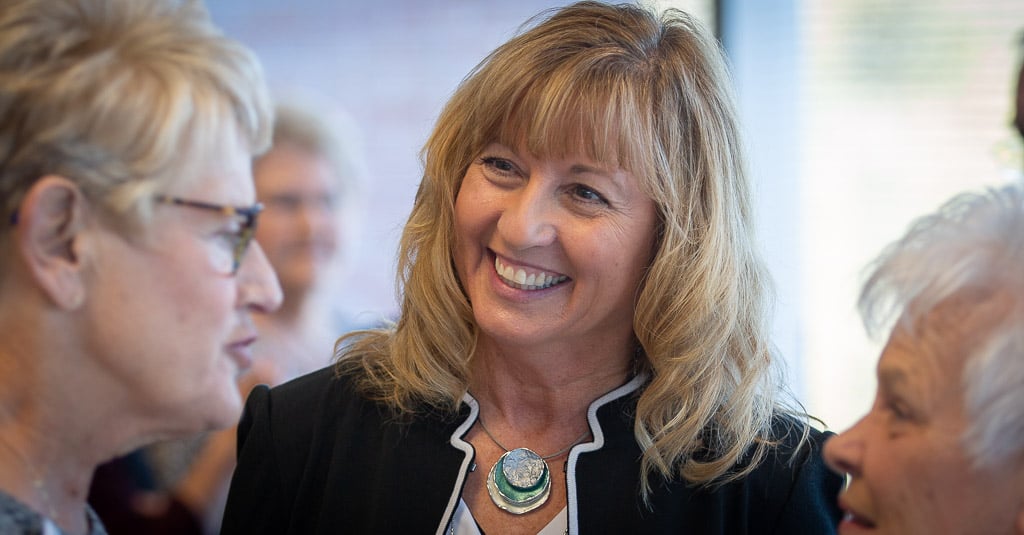Psychological resilience is the ability to cope mentally and emotionally with stress, trauma or a crisis. Resilience is important because the skills allow you to return to a pre-crisis state quickly and develop positive psychology and coping skills. Certain mental processes and behaviors can help with tough situations. Nebraska Methodist College President Dr. Deb Carlson is sharing her experience with resilience and the affects it can have on students during tough times and life stressors.

I have been studying resilience since I was a grad student working on my dissertation in the early ‘90s, but today there is a greater need for it than ever. In the beginning, resilience was thought to be for those who had severe hardships. We counted the number of “risk factors” that people had and studied how some people were able to overcome difficult situations and lead “normal” productive lives despite major life stressors.
I have spent the past 15 years studying cancer survivors who faced death and were able to see it as an opportunity to create their best lives. COVID-19 has exposed many things about people, society and ecosystems; one being the need for everyone to have community resilience (a community coming together with resources to withstand adverse situations) as well as mental toughness. When we are faced with any type of disaster or adversity in life, many become bitter (Why me? I didn’t get to walk across the stage, have the clinical I was looking forward to, take the trip I paid for or say goodbye to a loved one in the hospital).
There are so many reasons to be bitter, so much loss, so much negativity, so much change. Can we approach this the way a resilient person does? They look for the gift of tough times, challenges and difficulties. They develop confidence, compassion and the ability to overcome significant adversity. They know that this too shall pass, so they look for ways to see how it will be better in the future by doing what they can today. Here are a few techniques resilient people use that will help you get out of the bitter and become better.
1. Use the technique of reframing.
When things turn negative, stop and reframe it in a positive way. Instead of “I haven’t been able to go to the movies with my friends,” think “I have been able to spend more time with my family and slow down and think about what I really want in life.” What have you been feeling sad about that you can reframe? Practice psychological resilience, and you will start to see how a simple mind shift can change your whole perspective.
2. Evaluate your expectations.
Do you always expect the worst? You may think, “This course will be impossible without being in class. I know I am going to get this virus, I get everything.” Think instead, “I got this! I am smart. I can learn different ways. I can protect my health by making good choices. I will come out of this smarter and better able to handle changes.”
3. Reach out for help.
Resilient people know that life will be hard sometimes, so they look to people who have been there. They ask themselves, "How did others get through a traumatic event or adverse situation? What can I learn from them? I don’t have to do this myself." Having a mentor is the number one thing that successful people attribute to their success and they want to help others get there also. Just ask – help is always there.
4. Think of what you are grateful for.
Studies show that if you end each day with positive psychology, thinking of what you are grateful for, you will reduce your anxiety, sleep better and be happier. You can improve your mental health by building resilience.
This technique really rings true for me. For weeks, I struggled to think of things other than the basics, family, food, home – and then something happened. I started having gratitude for the little things: how the air smells after it rains, my feet for being able to walk, the taste of something. Soon I started to notice myself being happier, more focused and calm most of the day. Resilient individuals are on to something with this one.
There are many other traits of a resilient person, but if you practice just a few of these tips and tricks each day, you'll be on the right path. A powerful mindshift and positive thinking can make a huge difference in your mental health and outlook on life. At Nebraska Methodist College, we teach students resilience as well as having a strong heartset and compassion to help them in their healthcare careers. Now, more than ever, psychological resilience is an essential skill — no matter what life gives you.
Resilience? You got this!
###
Dr. Carlson joined Nebraska Methodist College in 2004. She is the third president and CEO of NMC. In her previous role as the Executive Vice President, she provided direction for the college's strategic planning, operations, accreditation, effectiveness, leadership development and succession planning, facility management, engagement and wellness. In addition, she provided oversight and strategic guidance over Compliance, Institutional Research, the Division of Professional Development and Community Partnerships, Business Office, Financial Aid, Food Services, Bookstore, Student Health, Facilities, Student Housing and Library Services.
Prior to NMC, Carlson taught at the University of Nebraska-Lincoln and was a research professor for the Center for Instructional Innovation. She started her career in teaching at Wayne State College.
